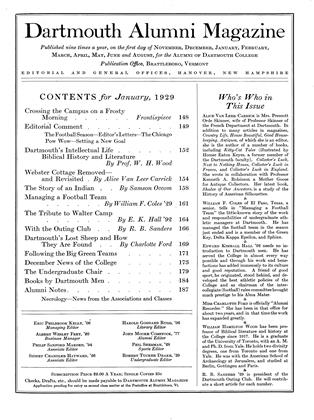"The old idea of loyalty to the teams as an obligation upon the student is passing. Attendance at the early games of the season is astonishingly small. The boys like to go to the big games, because they are good shows and worth the money. A poor game is a poor show; the stands are almost emptied before the game is over. Should one stay to the end out of loyalty? Fish! The cheering is weak and thin, and largely provided by middle- aged drunks. For a thousand rational men to bay in chorus 'Yell, yell, yell!' or 'wah-hoo- wah!' is a trifle absurd, a trifle childish. At Harvard, the great football rally before the Yale game was abandoned this year. Says the Harvard Crimson: 'The hortatory ex- perts have played to houses that only an in- voked loyalty could lift above tepidity.' At Yale, the traditional rally was held; and some 500 out of 5000 undergraduates ap- peared. The New York Herald-Tribune quotes the ringing words of Tad Jones at this funereal function: 'I never came to a Yale mass meeting which had so many empty seats. . . . Until tonight I have defended the new Yale spirit and called it the equal of the old. The empty seats make me doubt myself. . . . This appears to me to be the disintegration of the finest thing in Yale.'
"While Yale's worst enemy would hate to term the old football spirit the finest thing in Yale, the speaker's hebetudinous re- marks serve well to mark the change in un- dergraduate folkways. In the Eastern uni- versities football over-emphasis has changed to what many consider under-emphasis. The reasons? Certainly, in part, the very ex- aggeration of football. Among the partici- pants, many an intelligent young stalwart refuses to devote his four years in a seat of learning to mastering the forward pass. Many another finds it a little absurd that he should be paid only in fame for working so hard in such a profitable business. I think it was over a million that football grossed at Yale last year. And as for the spectators, who no longer are driven to the games by public opinion, they have discovered more amusing ways of passing a Saturday ' afternoon. Minor remedies are proposed: that practice be made open, so that students may redis- cover their team; that footballers be given more daylight practice; that the Faculty let down the scholastic bars for prep-school triple-threat numskulls. 'The Faculty,' said Mr. Dobie in the Pennsylvania game rally, 'is the cause of the poor football teams at Cornell, not the players or the coaches.' Rubbish! The cause of the poor football teams is that the undergraduate is growing up. And in that fact lies the hope for football as a college sport and nothing more."
 View Full Issue
View Full Issue
More From This Issue
-
 Article
ArticleWebster Cottage Removed—and Revisited
January 1929 By Alice Van Leer Carrick -
 Article
ArticleManaging a Football Team
January 1929 By William F. Coles '29 -
 Lettter from the Editor
Lettter from the EditorEditorial Comment
January 1929 -
 Class Notes
Class NotesCLASS of 1923
January 1929 By Truman T. Metzel -
 Class Notes
Class NotesCLASS of 1911
January 1929 By N. G. Burleigh -
 Article
ArticleThe Story of an Indian
January 1929 By Samson Occom
Article
-
 Article
ArticleCOLLEGE NOTES
OCTOBER, 1906 -
 Article
ArticleBIG INCREASE IN THE FACULTY
October 1919 -
 Article
ArticleMicrotext Center
April 1975 -
 Article
ArticleTwo Poems Diverged in a Mellow Mood
June • 1988 -
 Article
ArticleKeeping Alive the White Whale
MAY 1989 -
 Article
ArticleTHE NEED FOR UNUSUALNESS IN THE WORK OF THE COLLEGE
November 1917 By Hopkins

